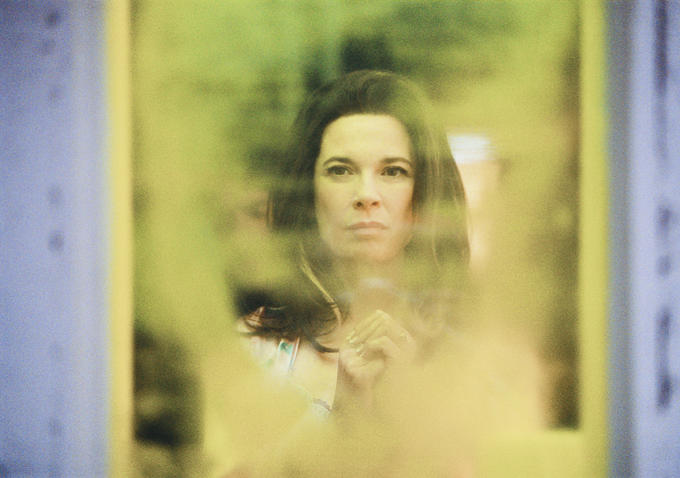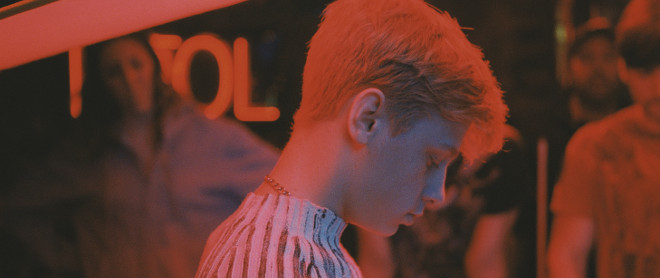Xavier Dolan’s fifth feature is an exemplar of this filmmaker’s evolution as an artist.
Featured Image: Anne Dorval and Antoine-Olivier Pilon in Mommy. Metafilms.
Author | Demitra ‘Demi’ Kampakis | Film Editor
Mommy is the fifth feature film to emerge from 26 year-old French-Canadian prodigy Xavier Dolan, whose 2009 directorial debut I Killed My Mother/J’ai Tue Ma Mere (a film he also wrote and starred in at the ridiculously young age of 18) seemed to serve as a therapeutic corrective for the young ingénue, who suffused his own personal experiences into the film’s exploration of the dysfunction surrounding a mother and son’s torrid dynamic. With his latest film, Dolan seems to be revisiting the thematic terrain of his earlier work, albeit with a few tweaks and shifts in perspective: whereas I Killed My Mother functioned as a supercilious and hyper-stylized exercise in cinematic catharsis as told from the lens of an embittered teenage son, Mommy presents a more contained, mature, mirror image of the former’s tetchy showiness, a self-effacement in which Dolan seems to be apologizing to his own mother. Yet Mommy—which opened stateside late January and took home the Jury Prize alongside Jean-Luc Godard’s Goodbye to Language during last year’s Cannes film festival—nonetheless maintains the ambitious markings of its young maker; a precocious talent and cinematic enfant terrible who robustly embraces the style, vigor and manic energy of his films with zealous commitment.
Diane “Die” Depris is an embattled widow whose troubled, volatile son Steve, an ADHD-afflicted teenager prone to unpredictable and violent outbursts, has just been released from his residential educational facility for starting a fire that resulted in severe burns for a fellow classmate. A working class single mother essentially living hand to mouth by cleaning homes with the occasional gig as a children’s book translator, Die is left with few options at her disposal. With mounting financial woes, she must now care for and home-school Steve at least until the lad turns 16, at which point she can choose to commit him without due legal process, according to a [fictional] Canadian law introduced at the film’s outset.

Yet their blissful reunion is short-lived—that is, until they meet and form an instant bond with their neighbor Kyla, a teacher on sabbatical who suffers from a stuttering speech impediment—for viewers are quickly confronted with the vitriolic infrastructure of the duo’s relationship: a discord fortified by pillars of resentment, contention and betrayal, as well as the destructive consequences of Steve’s explosive temper. Playing Die is the formidable Anne Dorval, a French-Canadian actress who was also cast opposite Dolan as the titular matriarch in I Killed My Mother. Whereas that film’s sourpussed self-absorption expressly aligned sympathies with its teenage son (unsurprising given the film’s autobiographical nature and its helmer’s age), Mommy broadens its scope to include the shifting perspectives of both. Though certain moments do invite greater empathy with Steve (likely more so for younger audiences), our sympathies are almost always with Die. This seesawing is one of the greatest strengths in Dolan’s script, for he refuses to assign either character the role of victim or villain. Both mother and son are flawed outsiders—wounded products of society’s social, emotional, and economic constraints—and the film successfully articulates the moral grey-area of its characters’ behavior and dilemma. The film makes us sensitive to the emotional damage suffered by our young protagonist, while offering a compelling parallel in Die’s frustrations and overwhelming circumstances.
This ambiguity is further bolstered by the work of Dorval and Steve’s Antoine-Olivier Pilon; who craft mutable performances that are at once forceful and unsettling as their characters seamlessly vacillate between vulnerability and volatility: charisma quickly giving way to shameless manipulation, salty exchanges, or combative venom-spewing that certainly betray the boundaries of appropriate parent-child interactions. Both actors meet the delicate demands of containing their characters’ thinly veiled passivity, which becomes increasingly fragile through every jaw clench or muscle tick. Though their reconciliations are often tenuous, a mutual understanding and unconditional protectiveness reinforce Steve and Die’s intense connection. Theirs is a love that is as peculiar as it is polar, fluctuating between violent physicality, prickly banter, and hints of incestuous intimacy.

And here is where the film shines in its queer intrigue and complex approach to sexuality; for just shy of further exploring this territory, Mommy does make several Freudian associations that suggest Steve’s unkosher maternal desires. Steve is often seen making explicit sexual advances to older women, usually in public but always in the presence of his mother—and a later slo-mo sequence set in a karaoke bar provides one of the most visceral interpretations of Oedipal jealousy in recent memory; the stylized use of color and editing further emphasizing Steve’s sensory overload. It’s interesting how, not withstanding these moments that echo maternal infatuation, Mommy never directly addresses Steve’s sexuality nor does it explore any of his burgeoning desires with others his own age, though there is a faint flirtation with queerness that is curious to consider. As Steve performs a song at the aforementioned karaoke bar, he is heckled with homophobic slurs; and during an earlier musical sequence for which Steve dons makeup, nail polish, and glam rock attire as him and Die bellow the notes of a sultry seduction number, his mother hardly bats an eyelash and merely responds to her son’s look with a cheeky “You queen!” An Oedipal ballad with queer undertones, Mommy’s coy approach to sexuality also invites the film’s subversion of sexual innocence. Steve’s irrational hostility to his mother’s date and subsequent tantrums bring to mind a degree of infantile regression, a point that is further reiterated when he wets his pants after Kyla (another maternal figure whom he takes a liking to, at times inappropriately so) finally lays down the law after one too many outbursts.

Given the stratospheric decibel at which Mommy operates, it’s not surprising that the film has been met with conflicting reactions ranging from sympathy to shock and bemusement. In constructing an aesthetically indulgent symphony of soap-operatic suffering, Dolan’s predilection for hysterics and visually saturated histrionics threaten to overpower the film’s delicate emotional core at times. Thankfully, his self-control as a filmmaker has matured, and here he strikes a balance between style and substance that still maintains a degree of Dolan’s ‘drama queen’ theatricality, without allowing these ostentatious conventions to undermine the complicated depth of its central bond.
Some of the film’s more bold (and some may argue, excessive) stylistic gestures even complement the film’s pathos, the most notable being its 5:4 aspect ratio, which resemble the narrow ‘selfie’ dimensions of an iPhone camera held upright. The film’s “portrait” framing perfectly captures the sadness in our character’s eyes, and almost magnifies the pain and suffering emoted through every facial gesticulation. Though the film’s tight framing nearly borders on claustrophobia, it is an apt reflection of the confining limitations these characters experience at the hands of society. This cramped space also renders the two sequences where the film’s frame widens all the more poignant and liberating, particularly the first time when Steve breaks the fourth wall and actually pushes open the frame himself. Presented during brief respites where the characters’ optimistic joy allows them to triumph over their “restricted horizons,” the frame’s widening feels like a jubilant and expansive spiritual redemption—a breath of fresh air for Dolan, his characters, and us.
Twitter: @DemionFilm
Facebook: facebook.com/demionfilm
